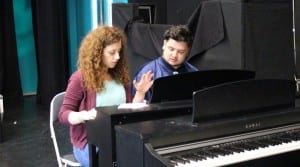Over the past few weeks, our show has gone on quite a dramatic journey and has developed into something I wouldn’t have expected when we first started out. Our original concept was based on ‘Bucket Lists’ – we wanted to speak to the public with the aim of exploring what people find most important at various stages of life. Whilst our show was still in research and development stages, our focus began to shift more towards the themes of memories and regrets as opposed to goals and ambitions.
During my research on memories, I came across this video which fascinated me.
The video essentially describes a pill, on the verge of being released, which can erase the fear we hold to our more unhappy memories. I thought it would be interesting to consider how we would function if our bad memories could be erased by taking this pill. Would we learn from our mistakes? How would we feel if we kept our bad memories but were able to associate it with something much happier? How could this effect the way we feel emotions? And although this pill is essentially for people suffering with PTSD, depression and anxiety, how long would it be until this is a prescribed drug for something less serious? These were all questions I thought would be useful to explore in our workshops. This inspired the company and we were set on having it influence the show but we still hadn’t found our central idea; we were still in search for our stone!
So we went out and had conversations with many members of the public; we visited a youth theatre, met with peers on the University campus and asked people on the high street about their ambitions, memories and regrets as well as their opinions on the pill itself. After receiving a variety of responses, it was encouraging to know that people were interested in the topic of memories and wanted to know more about the pill, however we still hadn’t found a story strong enough to be carried through the entire show.
I then began reading some more philosophical writings about memory and came across Oliver Sacks’ book The Man Who Mistook His Wife for a Hat (1986). In this book I discovered many stories of patients who had suffered from damage or an illness affecting the brain essentially leaving them with no or little memory – ‘I have no memory of the present. I do not know what I have just done or from where I have just come . . . I can recall my past very well, but I have no memory of the present.’ (Sacks, 1986, p. 33) These stories seemed to link everything we had been discussing about memories and regrets but now I saw the possibility of a narrative. Additionally, I thought it would be interesting to think of these real-life accounts in relation to the pill; people who choose to have their bad memories removed against individuals who have no choice in their memory loss at all. What I also found fascinating about these stories was that many of the patients suffering from amnesia who were talented musicians, still had the ability to remember how to play music, something which I discovered further in Oliver Sacks’ book Musicophillia, ‘Remembering music, listening to it, or playing it, is entirely in the present.’ (2011, p. 228) It seemed fitting to incorporate live music into our piece and we have recently been playing around with the piano in rehearsals; this has influenced some of our physical work too!
(Alice Dale, 2015)
Along with music, many of these cases have involved these men remembering their relationships with their wives but because of the illness, the extent of what they remember is minimal. The strength, compassion and love that these wives show is something that I am passionate about portraying in our piece as well as the struggles that these couples face. This has given me the idea to tell much of the story through the viewpoint of a wife, a supporter and an unconditional partner. I have cast a different female performer as The Wife for each scene we do to represent different points in The Man’s life as well as showing that this story is not about one couple in particular, it is inspired by many.
I am incredibly excited to develop the relationship/story between The Man and The Wife and to learn more about the connections in the brain and the science behind amnesia.
Works Cited
Sacks, O. (1986) The Man Who Mistook His Wife for a Hat. London: Picador.
Sacks, O. (2011) Musicophillia. London: Picador.
